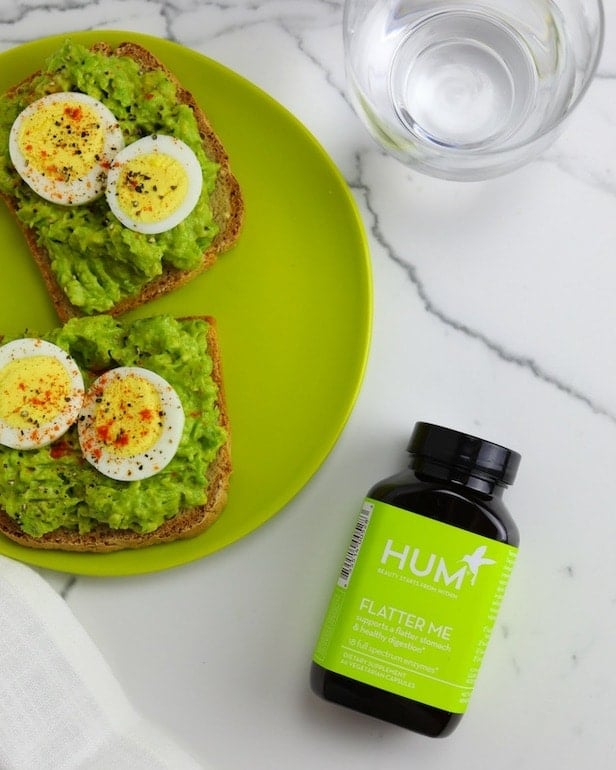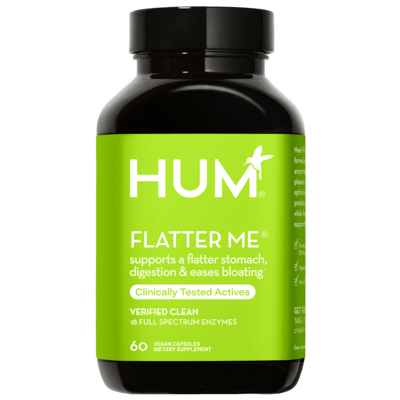How to Choose the Best Digestive Enzymes for You
Looking for the best digestive enzymes to ease your stomach woes? Carrie Gabriel, MS, RDN explains what to look for in digestive enzymes so you can get back to feeling your best.
If you’ve ever felt bloated after a meal (who hasn’t!?), stared in the toilet bowl only to see undigested bits of food, or struggled with digesting certain macronutrients, digestive enzymes could be for you.
After all, you can eat all the healthy food in the world, but it doesn’t mean much if you aren’t digesting it properly.
Enter, digestive enzymes. Digestive enzymes help us break down food more easily for better digestion and nutrient intake. Having proper digestion and nutrition is crucial to support a stronger immune system, promote weight loss, aid glowing skin, and promote overall health.
What are digestive enzymes?
Digestive enzymes are catalysts that enable molecules to change from one form into another. They’re necessary to break down macronutrients—such as carbohydrates, proteins, and fats—into smaller molecules that our bodies can use for energy and cellular processes.
Our bodies naturally produce digestive enzymes in our salivary glands, stomach, small intestines, and pancreas. However, many environmental and lifestyle factors can deplete our natural enzymatic resources. For that reason, it can be helpful to further support digestion by incorporating enzyme-rich foods or supplements into your diet.
Certain medical conditions can also lead your body to produce fewer digestive enzymes. If you fall into this category, consult with your doctor before taking a digestive enzyme supplement.
DIGESTIVE ENZYMES BENEFITS

1. Reduced bloating, gas, and diarrhea
One of the major benefits of digestive enzymes is less bloating and gas after meals. When your body lacks the enzymes needed to break down food, it can lead to undigested bits of food sitting in your intestines, where it can begin to ferment. The fermentation process produces gas that can lead to bloating. Undigested food can also draw water to the colon, leading to diarrhea or loose stool.
2. Better nutrient absorption
Because digestive enzymes ensure your food is properly broken down, they’re also key in getting your body the nutrients it needs from the food you eat. If you have insufficient enzyme production, you may have nutrient malabsorption, which can lead to vitamin deficiencies.
3. Eases digestion of hard-to-process foods
Whether it’s a meal out at a restaurant, your fave takeout order, or a special family dinner, taking a digestion enzyme before your meal can help make food more enjoyable, especially if you have a sensitivity to lactose or if your body has a difficult time with a fatty meal. Food should be joyful, and digestive enzymes can make more splurge-y foods more enjoyable.
How to Choose Digestive Enzymes

Different types of digestive enzymes are responsible for breaking down different types of food and macronutrients. Here are some of the best digestive enzymes to target in food sources, or as part of a broad-spectrum digestive enzyme supplement:
Best Digestive Enzymes for Protein
Protease, bromelain, and papain are among the best enzymes for breaking down protein.
Protease
This enzyme helps to break down protein into basic building blocks. This is an enzyme our digestive tract creates naturally. However, we produce less as we age. Hence, why as a dietitian I recommend taking a digestive enzyme that includes this specific enzyme. Protease benefits include promoting overall digestion and perhaps even supporting immunity.
Bromelain
Bromelain is one of the best enzymes for digestion. It can be found in pineapple. Bromelain helps aid in the digestion of proteins found in meat, grains, nuts, and cheese. Research also shows bromelain has anti-inflammatory properties and may also support joint health. Enjoy the benefits of bromelain by eating fresh pineapple after a heavy, protein-rich meal.
Papain
Papain helps break down proteins into peptides and amino acids for easier digestion. Papaya is a natural source which explains why it is such a popular fruit for relieving bloating and constipation. Papain also combines well with bromelain.
Interestingly, applying papain topically to the skin is sometimes even used as a natural remedy to relieve bug bites and other surface wounds.
Best Digestive Enzymes for Carbohydrates
Amylase, cellulase, and lactase are among the best enzymes for breaking down carbohydrates. Collectively, they are known as carbohydrases.
Amylase
Amylase is an enzyme our bodies produce to digest starches. This enzyme does a ton of work! It breaks down the fiber and sugars found in fruits, vegetables, and grains into smaller molecules. It is a type of carbohydrase, which is produced in the pancreas and salivary glands to help break down carbohydrates into simple sugars.
Cellulase
Cellulase is another carbohydrase and one of the basic building blocks of the plant kingdom that helps us digest fruits and vegetables. Plant-grazing animals such as cows and sheep actually produce this enzyme naturally in their bodies. However, that isn’t the case for humans. Humans cannot produce cellulase naturally, so we must get it from our diet or supplementation. Fresh fruits and vegetables are good sources of cellulase along with fermented foods like kimchi, sauerkraut, probiotic yogurt, and kombucha.
Lactase
Lactase is the digestive enzyme responsible for breaking down lactose. Lactose is a sugar that, as you might already know, is abundant in dairy products. Our bodies produce lots of lactase when we are infants and rely on our mother’s milk for nutrition. But, as we get older our lactase production declines. For some individuals, lactase levels become so low as adults that they become lactose-intolerant. This shortage of lactase results in uncomfortable gas and indigestion for lactose-intolerant individuals when eating dairy products.
Best Digestive Enzyme for Fat
The best digestive enzyme for breaking down fats in our diet is lipase.
Lipase
Lipase breaks down fats into fatty acids and glycerol. It’s the best digestive enzyme for digesting foods like olive oil, butter, cheese, and other plant and animal fats. Fatty acids are important because they make up the bulk of our cell membranes and provide energy, among many other benefits.
Do I need a digestive enzyme supplement?
While these enzymes are critical for digestive health, many of us don’t have the correct balance in our bodies.
A deficiency in digestive enzymes can result in improperly digested food in the small intestines and any of the following issues:
- reduced nutrient absorption
- gas and bloating
- indigestion
- constipation
To support optimal digestion and nutrient absorption consider adding foods with naturally occurring digestive enzymes, or adding a broad-spectrum digestive enzyme to your diet.
If you have a history of stomach ulcers, you should consult with your primary-care physician before taking any enzymes.
What to Look for In Digestive Enzymes
Wondering how to choose digestive enzymes that work for you? As a registered dietitian, here’s what I recommend looking for to choose the best digestive enzyme supplement when shopping.
Broad-Spectrum
First, I recommend looking for a broad-spectrum digestive enzyme supplement. (These are sometimes also referred to as full-spectrum.) This means the supplement combines multiple enzymes to cover all your needs instead of having to amass a big, expensive collection of single enzymes. Also, because your meals combine different food groups, you can support digestion of all the macronutrients at once. Be sure to look for a combination of specific enzymes such as protease, amylase, cellulase, lactase, and lipase.
Plant-Based
The best digestive enzyme supplements will typically use plant-based enzymes. These enzymes help target gut health with low-to-moderate acidity. They can also help relieve stress on your small intestines, making them inherently more effective than animal-based enzymes.
Naturally Formulated
Then, be wary of purchasing digestive enzymes with a bunch of fillers such as artificial colors and flavors. Instead, look for natural formulas that may include herbs such as ginger, fennel, or peppermint for further digestive support.
Research-Backed
As always, a good rule of thumb is to look for enzymes with science-backed evidence supporting them. A good manufacturer will formulate based on clinical research. You can also check for dietitians or doctors specializing in gut health to back the enzyme you intend to purchase.
HUM’s Flatter Me checks all of these boxes and is one of the best digestive enzymes to support healthy digestion and reduce bloating. It also contains fennel, peppermint, and ginger, natural ingredients that aid digestion.

When To Take Digestive Enzymes
Depending on your needs, you may want to take digestive enzymes every day before your two biggest meals. Other people may only want to take them when they’re eating a particularly large meal or a meal that’s heavier in fat, protein, or carbohydrates, or specifically when they consume dairy.
Ideally, take a digestive enzyme supplement just before a meal. That is when they will be most effective. If that’s too difficult to remember, you can take it in the middle or at the end of a meal as well.
I recommend leaving digestive enzymes out on the table where you eat. That way, you have a visual reminder to take it during the meal.
HOW LONG DOES IT TAKE FOR DIGESTIVE ENZYMES TO WORK?
Unlikely some supplements that may take days or weeks of consistent use to see an impact, digestive enzymes get to work right away. They usually begin working within 10 minutes of taking it, which is why it’s best to take it just before your meal for the best results.
Of course, if you need to and your doctor has cleared it, you can take digestive enzymes consistently over the long term to achieve immediate relief of bloating and digestion benefits.
WHAT TO EXPECT WHEN TAKING DIGESTIVE ENZYMES
A person who is taking digestive enzymes can expect to feel:
- less bloating after their meal
- less signs of indigestion (i.e., heartburn, flatulence, abdominal discomfort)
Side effects of digestive enzymes are uncommon for most people who supplement digestive enzymes. However, some people who have sensitivities or allergies to certain enzymes may experience:
- nausea
- diarrhea
- vomiting
Pro tip: It’s best to store your digestive enzymes in a cool, dry place. (Ideally, 77 degrees or cooler.) Limiting exposure to moisture will ensure your supplements stay potent and effective.











